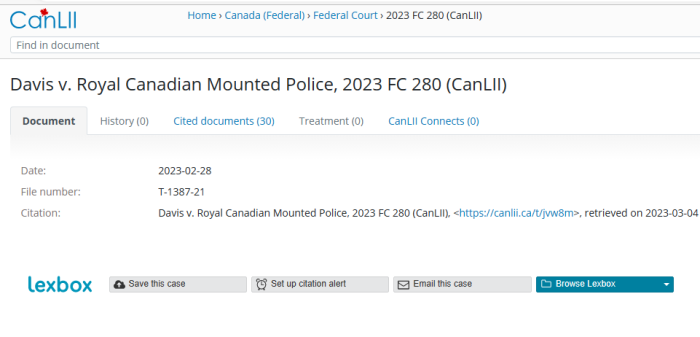
The Federal Court of Canada has confirmed a decision that Court lacks jurisdiction with many employment matters due to the Federal Public Sector Labour Relations Act, or FPSLRA.
While this isn’t specifically related to vaccine passports, there is overlap with the reasons this case was thrown out.
Dreena Davis works for the RCMP Employee & Management Relations Office Workplace Responsibility Unit, as an Internal Conflict Management Practitioner. The problems go back to 2017, and the specifics are beyond the scope of this article.
As a side note: it’s always interesting to see someone self-representing, as was the case here. Just because lawyers are involved, it doesn’t mean they are worth the expense.
From the ruling:
[24] On January 14, 2022, the Defendant moved to strike the claim on the basis that: (i) the essential character of the Plaintiff’s claims are employment issues which are regulated by an exclusive labour relations regime, therefore pursuant to section 236 of the Act the Plaintiff has no right of action; (ii) the Plaintiff’s recourse is to grieve each of her employment-related allegations and proceed with those grievances until their final resolution, as to do otherwise would create a parallel system; (iii) if there are allegations relating to her dissatisfaction with administrative decisions then the proper remedy is judicial review of any final decision after proceeding through the complaints process; and (iv) the claim is an abuse of process as the Plaintiff is seeking to make a collateral attack on administrative findings.
[25] In response to the motion to strike, the Plaintiff submits that “Part 2 of the [Act] does not apply to the excluded and unrepresented employees due to the Legislative error.” She alleges that legislative error occurred in 2003 when Parliament attempted to import the excluded and unrepresented employees into the Act by changing the definition of an “employee”. She submits that the grounds of the Defendant’s motion relating to the complete code as comprised in the Act, including section 236, are therefore “moot” because the Act does not apply to unrepresented employees on the basis of this legislative error.
[26] The Plaintiff further submitted in response that “there is no grievance procedure for the unrepresented employee within the RCMP”. She requests that the Court use its residual discretion on the basis that harassment and systemic negligence constitute extraordinary circumstances. The Plaintiff alleges that the grievance process was a sham and corrupt, as was the grievance system generally. Alternatively, the Plaintiff requested that she be able to apply in the appropriate forum.
In fairness, there were issues with the drafting itself, but those can often be fixed by amendment, or by redrafting.
What’s odd is that the Plaintiff appeared to be following the right steps originally. She filed a harassment complaint with the RCMP in December 2018 (paras 11 and 12), but didn’t like the decision. Afterwards, she filed a grievance over the outcome in March 2020, which was escalated internally (paras 13 and 14). June 2021, the grievance was denied.
After that, she filed an Application for Judicial Review in July 2021, in order to quash the earlier findings. This would have been the correct step, if there were issues to look at.
Bizarrely, Davis discontinued the Notice of Application on September 3, 2021, and filed a Statement of Claim on the 9th. Perhaps she found the scope available from an Application was too narrow.
March 2022, there was a hearing, as the RCMP tried to have the case thrown out. While the Claim was “unfocused, argumentative, and convoluted” (para 32), the fatal error came when the Associate Judge ruled that Section 236 of the FPSLRA meant the Courts lacked jurisdiction to hear the matter. The Claim was struck.
A review was sought, and this week a Judge concluded that there was no reversible error. The Federal Court wasn’t able to hear the Claim because of Section 236 of the FPSLRA.
From the ruling, it’s clear that there was some grievance process in place, and that she did make use of it. But the Courts typically don’t get involved in such employment matters.
Davis had also questioned whether the Associate Judge had been accommodating enough to her as a self-represented litigant. The response was that she had been.
Again, this isn’t a vaccine passport case, but there are parallels with the issues. If there is legislation or a collective bargaining agreement in place, there can be virtually no access to the Courts. While she may not have been part of a union, there were other options available, and she used them, the Court found.
(1) https://www.canlii.org/en/ca/fct/doc/2023/2023fc280/2023fc280.html
And on the topic of lockdown measures, including vaxx passes….
RECENT LOCKDOWN CASES (LIST IS NOT EXHAUSTIVE BY ANY MEANS)
(A) Ontario Court Rules 12 Year Old Cannot Be Forced To Take Vaxx
(B) Case Thrown Out When Judge “Takes Judicial Notice”
(C) BCSC Throws Out 4 Cases Involving Vaccine Passport
(D.1) Motion To Strike Federal Travel Restrictions Cases For “Mootness”
(D.2) Federal Court Vaccine Passport Challenges All Struck As “Moot”
(E) University Of Lethbridge Vaccine Pass Challenge Thrown Out For “Mootness”
(F) NS Court Of Appeals On Strang’s Ban On Public Gatherings
(G) AB Court Of Appeals Confirms HCW Can Deny Care For Unvaxxed
(H) University Of Western Ontario, And Their Vaxx Pass Getting Upheld
(I) BCSC Throws Out Quesnel Case, Arbitration Mandated As Solution
(J.1) CSASPP Lawsuit Approaching Certification For Class Action Status
(J.2) CSASPP Certification Hearing Videos Now Available Online
(J.3) CSASPP Certification Hearings To Resume In April 2023
(K) UCalgary Prof Files CHRT Complaint To Bring Back Masks On Planes
